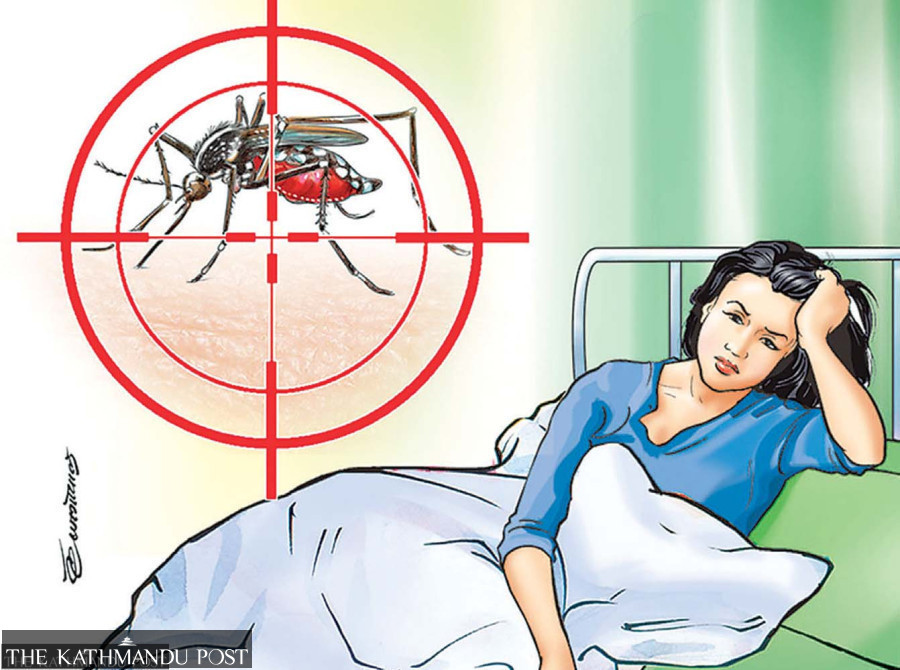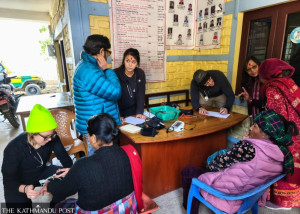Health
Private labs are fleecing dengue patients
Some hospitals are reportedly charging up to Rs3,000 for a test although the testing kit costs less than Rs100.
Arjun Poudel
A team of senior health officials from the Epidemiology and Disease Control Division, who were deployed recently in Gandaki Province to assess the latest situation of the dengue spread, returned with complaints.
Along with health workers serving at local bodies and provincial hospitals, elected representatives and local leaders of political parties, with whom they discussed, complained about exorbitant testing charges at private laboratories.
“We are aware of the excessive prices being charged by private labs for dengue testing and held discussions about setting a maximum price but couldn't reach a decision,” said Dr Yadu Chandra Ghimire, director at the division. “For the next dengue season, we would make a decision about slashing the testing charges.”
Nepal has been witnessing a rapid surge in new cases of dengue infection in recent months. Health authorities, however, do not concede that the number of new dengue cases is rising alarmingly. Doctors say there could be dengue patients in almost all households, especially in the Kathmandu Valley and in major cities like Pokhara.
Officials say that state-run health facilities do not charge for dengue testing, and they are aware of excessive charging by private labs despite the significant decline in the cost of rapid diagnostic test kits.
“It cost less than 100 rupees for a rapid diagnostic testing kit, but private labs have been charging excessively,” an official at the Department of Health Services said, asking not to be named, as he is not authorised to speak to the media. “Due to a lack of regulation, private labs and hospitals have been fleecing patients, and health officials have been avoiding making decisions to appease the private laboratories and hospitals.”
Public health experts say that it was obvious for patients to bear brunt when the authorities concerned, including the health minister, focus on gaining popularity by announcing populist programmes that are not feasible to implement with existing resources.
“Some hospitals have been charging up to Rs 3,000 for dengue tests,” said Dr Baburam Marasini, a public health expert. “When the authorities forget their prime duties and fear antogonising private hospitals and labs, it is inevitable that patients will suffer.”
Most state run health facilities and labs remained closed during Tihar holidays, which forced infected patients to seek services at private hospitals.
Meanwhile, the Department of Health Services said that its attention has been drawn to the excessive charging for dengue testing at private labs.
“I have noted the issue and will discuss it with the Health Ministry,” said Dr Bikash Devkota, director general at the Department of Health Services. “We will make some decisions regarding this issue.”
Dengue is a mosquito-borne disease transmitted by female Aedes aegypti and Aedes albopictus mosquitoes. The same vector also transmits chikungunya, yellow fever, and Zika viruses, according to the World Health Organisation.
So far, only 12 people have died, and over 29,000 have been infected since the start of 2024 if the government data is to be believed. Experts say reported dengue cases may only represent a small fraction of the true scale of the outbreak, as around 90 percent of the infected people do not show any symptoms and health authorities often concealed the actual number of deaths and infections.
As there is no specific treatment for dengue, health workers provide symptomatic care and diagnose patients based on symptoms, including platelet-rich plasma transfusion.
According to doctors, mild to high fever, severe muscle pain, rashes, severe headache, and pain in the eyes are some symptoms of dengue.
The World Health Organisation (WHO) says there is no specific treatment for severe dengue, but early detection and access to proper medical care can save lives.




 13.12°C Kathmandu
13.12°C Kathmandu














